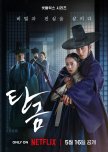A Haunting Tale of Love and Power
Dear Hongrang is a visually stunning and emotionally gripping Netflix period K-drama that dives deep into the struggles of those marginalized in a rigid, patriarchal society. Set in a world where power is held by the privileged few, it captures the harsh realities faced by women and the powerless, delivering a story as beautiful as it is heartbreaking.
The art direction is breathtaking, with every scene crafted to perfection, and the music effortlessly sets the tone. The cast shines, especially Lee Jae Wook as Hong Rang. His performance is magnetic—whether in emotionally charged flight scenes or moments of captivity and abuse, his raw intensity leaves a lasting impact.
What truly sets this drama apart is its layered storytelling. The grim depiction of powerlessness is portrayed with gut-wrenching realism. However, the series isn't without flaws. The missing child and snowman subplot, brimming with potential, gets sidelined by the love triangle. The one-sided affection from Jae I's adoptive brother, Mu Jin, feels overextended and detracts from the main plot.
As for the romance between Hong Rang and Jae I, it struggles with pacing. The prolonged "is he or isn’t he her real brother?" dilemma keeps viewers at a distance, making it hard to fully invest. By the time the truth is revealed, their sudden, intense love feels abrupt and underexplored, leaving little room for the audience to connect with their relationship. A tighter focus on the missing child storyline and deeper exploration of key characters would have elevated the drama even further.
Despite these missteps, Dear Hongrang is an emotionally charged, visually mesmerizing experience with unforgettable performances. Be prepared for heartbreak, but it’s a journey worth taking.
The art direction is breathtaking, with every scene crafted to perfection, and the music effortlessly sets the tone. The cast shines, especially Lee Jae Wook as Hong Rang. His performance is magnetic—whether in emotionally charged flight scenes or moments of captivity and abuse, his raw intensity leaves a lasting impact.
What truly sets this drama apart is its layered storytelling. The grim depiction of powerlessness is portrayed with gut-wrenching realism. However, the series isn't without flaws. The missing child and snowman subplot, brimming with potential, gets sidelined by the love triangle. The one-sided affection from Jae I's adoptive brother, Mu Jin, feels overextended and detracts from the main plot.
As for the romance between Hong Rang and Jae I, it struggles with pacing. The prolonged "is he or isn’t he her real brother?" dilemma keeps viewers at a distance, making it hard to fully invest. By the time the truth is revealed, their sudden, intense love feels abrupt and underexplored, leaving little room for the audience to connect with their relationship. A tighter focus on the missing child storyline and deeper exploration of key characters would have elevated the drama even further.
Despite these missteps, Dear Hongrang is an emotionally charged, visually mesmerizing experience with unforgettable performances. Be prepared for heartbreak, but it’s a journey worth taking.
Was this review helpful to you?












